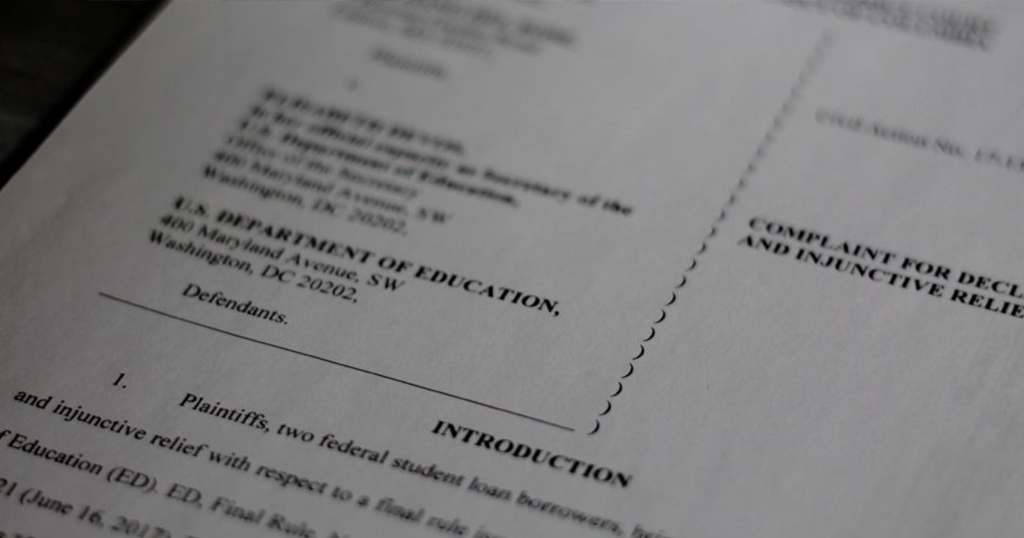
NYLAG v. Cardona
The Latest
On March 17, 2021, in a decision on the parties' cross-motions for summary judgment, the District Court agreed with NYLAG that the Department of Education unlawfully established a three-year limitations period for borrowers to file certain borrower defense applications. However, using a standard of review highly deferential to the government, the Court concluded that the other provisions of the 2019 borrower defense rule were not arbitrary and capricious.
NYLAG filed its notice of appeal as to the latter part of the decision on April 7, 2021. The parties have fully briefed the appeal, and the appeal is now pending before the Court of Appeals for the Second Circuit.
About NYLAG v. Cardona
-
Student advocates at NYLAG brought this suit to invalidate the Department of Education’s 2019 borrower defense rules, which reverse vital protections from predatory schools and impose onerous standards and procedural hurdles for defrauded students seeking to assert their legal rights to loan cancellation.
-
September 2019: The Department of Education established new borrower defense rules, making it harder for borrowers to assert their claims to loan cancellation.
February 19, 2020: This case was filed in the U.S. District Court for the Southern District of New York.
July 2020: New borrower defense rules take effect.
March 17, 2021: The District Court issued its decision on the parties’ cross-motions for summary judgment.
April 7, 2021: NYLAG filed its notice of appeal.
Dec. 11, 2023: Second Circuit hears oral argument in NYLAG’s appeal.
-
The Project on Predatory Student Lending and Public Citizen Litigation Group filed this case on behalf of New York Legal Assistance Group (NYLAG) against the Department of Education and former-Education Secretary Betsy DeVos.
Federal law allows students to seek cancellation of their federal student loans when the school they attended engaged in misconduct or closed suddenly. In 2016, the Department of Education issued new rules to stop schools from forcing students out of court, and to specify new procedures for borrower defense. Then-Secretary DeVos attempted to block those rules from going into effect three times – and lawyers from Public Citizen Litigation Group and the Project on Predatory Student Lending were successful in having those attempts declared illegal.
Undeterred, the Department of Education issued a new rule, which resulted from a flawed process and is grounded on the false premise that student borrowers are the bad actors. Ignoring the Department’s responsibility to students and taxpayers, the rule protects predatory schools from liability for their bad behavior. The rule is contrary to the purpose of borrower defense, which is to allow cheated borrowers to cancel fraudulent debt. Among other harmful changes, the new rule:
Eliminates conditions on the use of forced arbitration and class-action bans;
Increases the hoops students must jump through to obtain relief when their schools close;
Removes key disclosure requirements that inform students about their schools’ status;
Imposes a narrow three-year statute of limitations for borrowers to raise claims;
Eliminates the ability for borrowers to seek to have their claims decided as part of a group of similarly situated students; and
Heightens the evidentiary standard to which borrowers’ claims would be held, including requiring students to offer proof of financial harm beyond that of the federal loan itself.
-
February 19, 2020: Complaint
June 29, 2020: Plaintiffs’ Motion for Summary Judgment
July 3, 2020: Amicus Brief of the Institute for Policy Integrity at NYU School of Law
July 10, 2020: Amicus Brief of the Lawyers’ Committee for Civil Rights Under Law
July 24, 2020: Amicus Brief of the National Consumer Law Center
March 17, 2021: Order on Cross-Motions for Summary Judgment
July 21, 2021: Plaintiffs’ Brief on Appeal
July 28, 2021: Amicus Brief of States in Support of Plaintiffs on Appeal
October 20, 2021: ED’s Brief on Appeal
“DeVos’s new rule allows predatory institutions to escape responsibility for their deceptive and misleading conduct, and forces students – and organizations like NYLAG – to bear the consequences.”
— Adam Pulver, Public Citizen
Coverage
-

Borrower-Defense Rule Saved by Trump Veto but Still Faces Fight in Court | Inside Higher Ed
June 1, 2020
-

Lawsuit Challenges Trump Administration Toughening of Student Loan Cancellation Rules | NY Daily News
March 2, 2020
-

Senate Might Rebuke DeVos on Borrower Defense | Inside Higher Ed
February 28, 2020

